CS Universitatea Craiova
U Craiova 1948 Club Sportiv, commonly known as Universitatea Craiova (Romanian pronunciation: [universiˈtate̯a kraˈjova]), U Craiova is a Romanian a professional football team based in Craiova, Dolj County, currently playing in the Liga I, the top tier of the Romanian football league system.
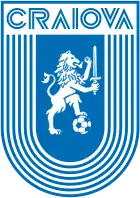 | ||||
| Full name | U Craiova 1948 Club Sportiv[note 1] | |||
|---|---|---|---|---|
| Nickname(s) | ||||
| Short name | U Craiova | |||
| Founded | 2013 | |||
| Ground | Ion Oblemenco | |||
| Capacity | 30,983 | |||
| Owners | Adrian Andrici (85%) Mihai Rotaru (10%) Laviniu Beze (5%) | |||
| Chairman | Sorin Cârțu | |||
| Manager | TBA | |||
| League | Liga I | |||
| 2020–2021 | Liga I, 1st of 16 | |||
| Website | Club website | |||
|
| ||||
It was founded in 1948 as the football section of the CSU Craiova sports club,[4] of which it was originally part of until 1991. During that period, it had won four national titles and five national cups. For the next two decades, its tradition was taken further by FC U Craiova, which was reorganised several times, disaffiliated and retroactively deemed as an unofficial successos. In 2013, the sports club refounded the football department,[5] which asserts to be the continuation of the original Universitatea Craiova—this has since been backed up by some court orders and the Liga Profesionistă de Fotbal, however the record is still subject of dispute with the also reestablished FC U entity and uncertainty persists.[6][note 2] In 2018, "the White-Blues" won the Cupa României, representing their first trophy following the refoundation.
On the European stage, Universitatea Craiova's best performances are reaching the semi-finals of the 1982–83 UEFA Cup and the quarter-finals of the 1981–82 European Cup. They were the first Romanian team to reach the semi-finals of a UEFA tournament and remain the only one to have knocked out at least one club from each of five strongest countries in European football: England, France, Germany, Italy and Spain.
"The Students" play their home matches at the Stadionul Ion Oblemenco, which has a capacity of 30,929. Craiova holds several rivalries, the most notable being the one with Dinamo București.
History
| Active departments of CS Universitatea Craiova | ||
|---|---|---|
| Football | Men's Basketball |
Women's Handball |
| Men's Volleyball |
Women's Volleyball |
Boxing |
| Athletics | Badminton | Bridge |
| Chess | Fencing | Judo |
| Karate | Table tennis | Wrestling |
Early years of football in Craiova (1921–1958)
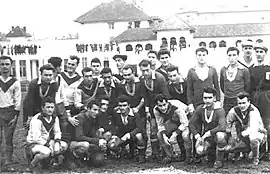
The football history in the city of Craiova began in 1921, when the first teams were founded: Craiovan Craiova and Rovine Grivița Craiova. In 1940, the two sides merged in what resulted to be one of the most successful Romanian clubs of the Interwar period, FC Craiova, which was also the first team of the city that won the Romanian football championship. However, the 1942–43 title is not recognized officially by FRF and LPF due to the unofficial character of the competition in that season.
Immediately after the foundation of the first university education institution – the Institute of Machines and Electric Devices – a group of teachers and students founded CSU Craiova in 1948, a sports club with athletics, volleyball, handball, table tennis, chess and football sections.[11]
Under the coordination of the Ministry of Public Education and of the National Union of Students in Romania, the football team UNSR Craiova (Uniunea Națională a Studenților din România) was formed and enrolled in the county championship. The first official match was held at Filiași on 5 September 1948, "the Students" being defeated 6–3. The white-blue shirt was dressed for the first time by the following line-up: Dumitrescu – Rădulescu, Mihăilă I, Carli – Ozon, Mihăilă II – Sabin, Ilie, Bădescu, Tudor, Serghi, under the command of head coach N. Polojinski.[11]
In 1950 the football section changed its name from UNSR Craiova to CSU Craiova, the same name as the parent club. In 1951, CSU Craiova defeated with 6–0 the local rival, Constructorul Craiova, in what was going to be the first official match played in Cupa României. In 1953 the club changed its name again, this time in Știința Craiova, and one year later at the Divizia B promotion play-off, hosted in Arad, Știința, coached by Nicolae Oțeleanu, qualified for the 1955 season, thus promoting for the first time in its history at the level of the second echelon. The club relegated back to Divizia C after only one season and remained at that level until 1958.[11]
Universitatea, a rising team (1958–1970)
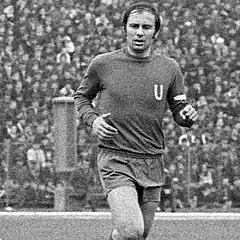
| Name | Period |
| UNSR Craiova | 1948–1950 |
| CSU Craiova | 1950–1953 |
| Știința Craiova | 1953–1966 |
| Universitatea Craiova | 1966–1991 |
| Universitatea Craiova | 2013–present |
In 1958 Știința promoted for the second time in the second league after a fight on the knife edge in the 3rd series of the Divizia C against Unirea Râmnicu Vâlcea, at the end of the season both teams finished with 34 points, but with the advantage of direct matches for the white and blue team.[12] In the first season after promotion, Craiova ended only on 13th place, out of 14, but progresses have been made in the next seasons: 1959–60 – 10th, 1960–61 – 2nd, but far away from the 1st place occupied by Dinamo Pitești, 1961–62 – 4th, 1962–63 – 4th.[13] 1963–64 Divizia B season was a dramatic one, with a four-way fight for promotion in the first series of the second league. At the end the Students won the promotion, but ended at the same number of points with the 2nd place, Metalul Târgoviște, one point in front of 3rd place, Poiana Câmpina and two points over 4th place, Dinamo Bacău. This 'historical act' was 'signed' by the head coach Nicolae Oțeleanu and following players: Dumitrescu, Vasilescu, Geleriu, Lungan, Deliu, Bărbulescu, Tetea, Ganga, Anton, Lovin, Onea, Vişan, Stanciu, Papuc, C.Stesnescu, A.Stenescu.[11]
As with the previous promotions, the first Divizia A season was a very hard one for the white and blues who saved from relegation in the last rounds, with just one point more than the first relegated team, Minerul Baia Mare. The end of the next season found Știința ranked 8th, in the middle of the standing, and they were already putting the first bases of a team able to issue claims to the title.
In the summer of 1966, the club changed its name again, this time from Știința Craiova to Universitatea Craiova, a name that will remain forever on the lips of all football lovers and team supporters from Romania. Nevertheless, supporters continued to include in their chants and their encouragements the name Știința. In the difficult moments of the games it is known that Universitatea supporters tend to chant: Hei, hei, hai Știința!
As Universitatea followed seasons of contrasting results, in some of them the team delighted the audience in others less, but has remained in the first division, regardless of the situation: 1966–67 – 3rd, 1967–68 – 11th, 1968–69 – 7th, 1969–70 – 4th. There have been 12 years of building and finishing a team that would delight the audience for the next two decades.[14]
"The Champion of a Great Love" (1970–1979)
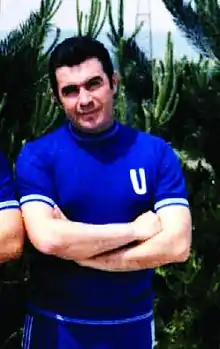
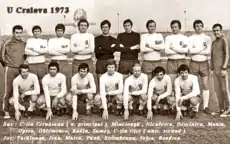
Craiova started the 70's with a team built around Ion Oblemenco and with players of a certain value as: Petre Deselnicu, Teodor Țarălungă, Lucian Strâmbeanu or Dumitru Marcu, among others. The start of the decade was not the most convincing, but a decent one, 6th place at the end of the 1970–71 season and 8th place at the end of the 1971–72. The first attempts of the students to shine took place in the 1972–73 season, they finished at the same number of points with Dinamo București, the title of the champion was taken by Dinamo, due to a better goal difference. This season remained in the history as the season of the birth of the nickname: "the Champion of a Great Love", a nickname created by the poet Adrian Păunescu, a big fan of the team from Bănie, he named Dinamo only as the champion of the country, indicating somewhat the suspicious circumstances, in which it was said, that Craiova lost the title.[15]
In the 1973–74 season the title fight was again between Universitatea and Dinamo, but this time Craiova won the title with an advance of a point in front of Dinamo, being the first team of a University that won a national title in Europe. The achievement was more fabulous as Dinamo was considered as a spoiled team of the communist regime, which often influenced the results as well and also after the last season's incidents, Universitatea was increasingly seen as a representative of the people, of the simple man, in the struggle with the communist regime, of pure football and football played on the pitch against the one dominated by arrangements and influences, so the Champion of a Great Love phrase has gained increasing power, including in the years to come.[16] The historical squad that won the first title was coached by Constantin Cernăianu and Constantin Oțet and had the following players included: Oprea, Manta – Niculescu, Bădin, Deselnicu, Velea, Strâmbeanu, Ivan, Niță, Balaci, Berneanu, Țarălungă, Oblemenco, Bălan, Pană, Boc, Ștefănescu, Marcu, Stăncescu, Kiss, Chivu, Negrilă and Constantinescu.[11]
Followed a 1974–75 season that brought the first UEFA European Cup presence, a double match against Swedish team Åtvidaberg, lost 3–4 on aggregate, but a decent 3rd place at the end of the championship. 1975–76 season brought a significant fall, the team ending the season only on the 6th place and announcing a change of generation in the team. In the last season of the legendary Ion Oblemenco in the white and blue shirt of Universitatea, the expectations were no longer so high, but the team from Craiova amazed the audience again, winning for the first time in its history the Romanian Cup in a final against Steaua București, being the way of Oblemenco's generation to take good-bye from the supporters. Also in the Divizia A the team finished on 3rd place.
With the generation exchange made, Universitatea continued to impress in 1978 by defending his Romanian Cup trophy, won a year ago, this time against Olimpia Satu Mare and a 6th place in the league. 1978–79 season was ended on the 4th place and in the UEFA Cup Winners' Cup the club was eliminated in the first round by Fortuna Düsseldorf.
Craiova Maxima (1979–1991)
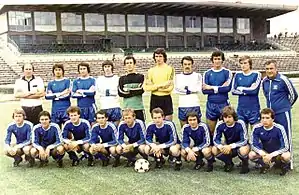
Craiova Maxima ("The Maximum Craiova") was the second golden generation of Universitatea and a team that recorded, especially in the early and mid 80's, the most notable continental performance in the history of the club. It was a squad composed by a lot of players that grew up in the proximity of the first golden team and also this team gave a large part of the 'skeleton' of the Romania national football team such as: Ilie Balaci, Rodion Cămătaru, Costică Ștefănescu, Zoltan Crișan, Ion Geolgău, Aurel Beldeanu, Costică Donose and Silviu Lung, among others.
At the end of the 1979–80 has been crowned the champion of Romania for the second time. Squad: Boldici, Lung – Negrilă, Tilihoi, Ștefănescu, Ungureanu, Balaci, Beldeanu, Crişan, Donose, Cămătaru, Geolgău, Cârțu, Irimescu, Purima and Ciupitu – coaches Valentin Stănescu and Ion Oblemenco.[11] In this formula Universitatea made a great UEFA Cup campaign by eliminating Wiener SC and Leeds United until was hardly stopped in the third round by German side Borussia Mönchengladbach, 1–2 on aggregate.
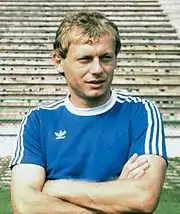
The team caught wings and made a fantastic 1980–81 season, managing the historical double, the cup and the championship. As a result of this performance, the students qualified for the 1981–82 European Cup where Craiova Maxima became more and more visible by eliminating Olympiacos and KB, being stopped in the quarter-finals by Bayern Munich, 1–3 in aggregate, an historical performance for the Romanian football at that time.
The long-standing presence in the European Cups affected the team, which finished only on 2nd place, but qualifying in the UEFA Cup and writing history throughout the 1982–83 season, being the first team in the history of Romania that qualified in a European Cup semi-finals. Under the management of Constantin Oțet and Nicolae Ivan the white and blues took out important names in European football, such as Fiorentina (Serie A runners-up), Bordeaux and Kaiserslautern. In the semi-final, Universitatea encountered Benfica, two times European champions and three times European Cup finalists at that time. After two draws, the Portuguese side advanced to the final on aggregate away goals. In the Divizia A, the team finished again on the 2nd place.
The following years have found Universitatea Craiova as a constant presence in the first part of the standing: 1983–84 – 3rd, 1984–85 – 4th, 1985–86 – 3rd, 1986–87 – 5th, 1987–88 – 5th, 1988–89 – 5th and 1988–89 – 3rd. Also the team had a constant presence in the European Cups eliminating remarkable teams such as: Real Betis, Olympiacos, AS Monaco or Galatasaray, but they never qualified far than the third round again. The Students also lost a Romanian Cup final in 1985, 1–2 against Steaua București.
In 1991, CS Universitatea Craiova touched again the peak of the Romanian football, when the event is being held again. Prunea, Mănăilă, Săndoi, Ad. Popescu, Mogoşanu, Ciurea, Olaru, Cristescu, Zamfir, Badea, Pigulea, Agalliu, Craioveanu and Neagoe were the last players that have kissed the championship trophy. Along with coaches Sorin Cârţu and Ștefan Cioacă.[11]
FC U Craiova (1991–2011)
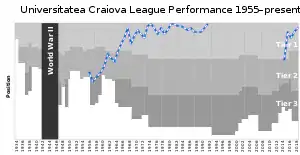
In 1991, Universitatea Craiova conquered its last national title and Romanian Cup, under the management of Sorin Cârțu.
However, in the same year, the CS Universitatea Craiova sports club dissolved its football section[17] and Fotbal Club Universitatea Craiova continued its tradition until the early 2010s (until 1994, the club was still controlled by the Ministry of National Education). In this troubled period of history, FC U won a Romanian Cup in 1993 and reached three finals, in 1994, 1998 and 2000. The results were far from what fans were used to expect from their team. An important cause was the faulty management of the 1990s and early 2000s, also as a result of the fall of communism, which led to the 2005 relegation, when 41 consecutive years of Divizia A were celebrated.
On 20 July 2011, the club was temporarily excluded by the Romanian Football Federation[18] for failing to withdraw their dispute with former coach Victor Pițurcă from a civil court, as per article 57 of the FRF statute which states that the Football Federation solves all the sports lawsuits.[19] However, the article allows disputes regarding employment contracts to be adjudicated in civil court.[20] The exclusion decision was approved by the FRF General Assembly on 14 May 2012.[21] All of the squad players were declared free agents and signed with other clubs.
Refounding and struggles to regain identity (2013–present)
– Corneliu Andrei Stroe, club president during the Craiova Maxima era, on 26 August 2013[22]
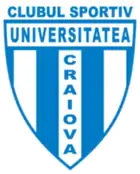
On 20 July 2011, the Romanian Football Federation decided to disaffiliate FC Universitatea Craiova,[23] but the decision was attacked in court.[24] Consequently, in the summer of 2013, local authorities of Craiova, supported by Pavel Badea, and associated with Club Sportiv U Craiova SA, refounded the football section of CS U Craiova.[25] CS U claimed that it owns all of the Universitatea honours,[26] and that the sports club did not offer its records to FC U Craiova, which was considered a new club; this was confirmed in justice in June 2016[27] and reaffirmed by LPF in November 2017.[7] Therefore, CS Universitatea Craiova is the rightful owner of the brand and records—excepting the 1992–93 Cupa României, claimed[9] but not officially part of CS U's honours.[28]
On 14 August 2013, CS Universitatea Craiova was provisionally affiliated to the Romanian Football Federation, following complications with licensing file.[29] After resolving the issues, the club was introduced in Liga II, the second tier of the Romanian league system. Universitatea made its season debut on 27 August, with a 6–1 success over Pandurii II Târgu Jiu in the fourth round of the Romanian Cup.[30] In the 2013–14 Liga II season, CS Universitatea Craiova and FC U Craiova met in two direct matches, which gave rise to a lot of tension and uncertainty regarding the true identities of the clubs. CS Universitatea Craiova promoted back to Liga I in 2014 after 23 years of absence, while FC U Craiova was excluded again, this time permanently, but later reappeared under the name of FC U Craiova 1948 in 2017.
After the promotion, Universitatea ended the 2014–15 campaign on the 5th place.[31] This result was followed by an 8th place in the 2015–16 season and a 4th place at the end of the 2016–17 season, the latter ensuring return to European competitions. The comeback brought an important opponent in the third qualifying round of the UEFA Europa League, Italian side A.C. Milan, Craiova leaving the competition after 0–3 on aggregate.[32][33] On 27 May 2018, Universitatea won its first trophy since being refounded after beating second tier club Hermannstadt in the Cupa României final. The game ended 2–0 and was hosted by the Arena Națională in Bucharest.[34] One month later, the Romanian Football Federation approved an application to change the name of the society from "Club Sportiv U Craiova SA" to "U Craiova 1948 Club Sportiv SA".[1] As the winner of Cupa României, Craiova subsequently took part in the 2018 Supercupa României, which they lost 0–1 to CFR Cluj on home ground.[35]
Two years later on 3 August 2020, also in a home ground game against CFR Cluj, Universitatea Craiova came close to winning its first national league since the 1990–91 season. Dan Nistor opened the scoring for Craiova in the eleventh minute, but their title contenders turned the game around and won the final fixture of the season 3–1, thus becoming champions for the third consecutive year.[36]
Grounds
Stadionul Ion Oblemenco (1967)
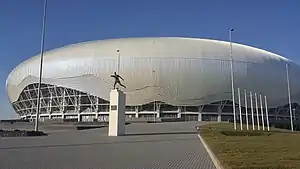
Ion Oblemenco Stadium was a multi-purpose stadium in Craiova, and was originally named Central Stadium. It was used mostly for football matches and would hold up to 25,252 people before it was demolished. The stadium was opened on 29 October 1967, with the national teams of Romania and Poland drawing after scoring two goals each.
It hosted many memorable matches during the Craiova Maxima era, such as the 1981–82 European Cup quarterfinal against Bayern Munich and the 1982–83 UEFA Cup semi-final against Benfica. Following the death of Universitatea Craiova legend Ion Oblemenco in 1996, the stadium was renamed in his honour. In 2008, the stadium underwent a major renovation, and in 2015 was entirely demolished.
The new Stadionul Ion Oblemenco
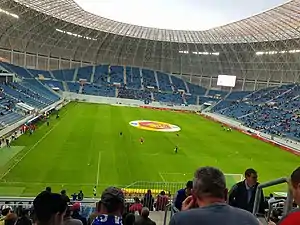
The new Ion Oblemenco Stadium, with a capacity of 30,929 seats, was inaugurated on 10 November 2017 with a friendly match between Universitatea Craiova and Czech club Slavia Prague.[37]
Support
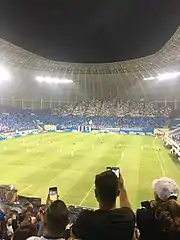
Universitatea Craiova has many fans in Craiova and especially in the region of Oltenia, but also in Romania, being the third-most supported team in the country after Steaua București/FCSB and Dinamo București, as shown in a 2016 survey.[38]
Many ultras groups exist, but in 2013 a strong division among the fans occurred due to the uncertainty regarding the true identities of the two clubs which claim the record of Universitatea. Sezione Ultra' 2000 and Utopia from Peluza Nord chose to support CS Universitatea Craiova,[39] while Praetoria and Ultras 2004 from Peluza Sud 97 chose FC U Craiova. Later in 2017, Ultras Craiova 2004 left FC U and decided to remain neutral.[40]
After some time, giving the fact that CS Universitatea Craiova acquired most of the records many new groups were founded in Peluza Nord Craiova: North Lions,[41] Vechiul Spirit Ultras, Nord Oltenia, Gruppo Sibiu, Gruppo Capitala and UNU MAI UNIT.
In March 2018, FC U Craiova supporters attending a friendly game between Romania and Sweden at the Stadionul Ion Oblemenco booed CS U player Alexandru Mitriță upon being substituted out.[42] They also broke chairs, and as a response CS U fans symbolically used insecticide to "get rid of the stench" left over by Peluza Sud 97 ultras.[43]
Rivalries
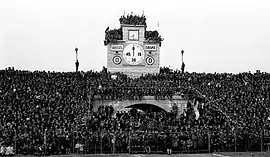
Universitatea Craiova holds a long-standing grudge against Dinamo București, which developed at the end of the 1972–73 season. The two finished with an equal number of points in the national championship, but Dinamo was awarded the title due to having a slightly superior goal difference.[44][45]
Știința also has less intense rivalries with the other two important clubs from the capital, Steaua București/FCSB and Rapid București. Throughout time the club had local competition with sides such as Extensiv Craiova and, from 2013, FC U Craiova, the aforementioned entity which as well claims the Universitatea record. The 2010s also saw the start of a minor rivalry against Pandurii Târgu Jiu, another notable team from Oltenia.[46]
Honours
Note: As of November 2017, LPF attributes all Universitatea Craiova trophies won between 1948 and 1991 to this entity,[7] however they are not displayed on the club's UEFA.com profile.[8] The ownership of these honours is disputed with FC U Craiova 1948, which informally acted as the continuation of Universitatea Craiova after the sports club dissolved its football section in 1991.[17] Another court order from 2018 suggested that neither of the current clubs actually hold the original honours.[10]
Cups
- Cupa României
- Supercupa României
- Runners-up (1): 2018
Players
First team squad
Note: Flags indicate national team as defined under FIFA eligibility rules. Players may hold more than one non-FIFA nationality.
|
|
Reserves and academy
- As of 15 January 2021[50]
List of under-21s and academy players with senior squad numbers
Note: Flags indicate national team as defined under FIFA eligibility rules. Players may hold more than one non-FIFA nationality.
|
|
Out on loan
Note: Flags indicate national team as defined under FIFA eligibility rules. Players may hold more than one non-FIFA nationality.
|
|
Club officials
Board of directors
|
Current technical staff
|
Records and statistics
UEFA Europa League
| Season | Round | Country | Club | Home | Away | Aggregate |
|---|---|---|---|---|---|---|
| 2017–18 | Third qualifying round | Milan | 0 – 1 | 0 – 2 | 0 – 3 | |
| 2018–19 | Third qualifying round | Leipzig | 1 – 1 | 1 – 3 | 2 – 4 | |
| 2019–20 | First qualifying round | Sabail | 3 – 2 | 3 – 2 | 6 – 4 | |
| Second qualifying round | Honvéd | 0 – 0 | 0 – 0 | 0 – 0 (3–1 p) | ||
| Third qualifying round | AEK Athens | 0 – 2 | 1 – 1 | 1 – 3 | ||
| 2020–21 | First qualifying round | Locomotive Tbilisi | N/A | 1 – 2 | N/A |
League history
|
|
Notable former players
- Brazil
- Bosnia and Herzegovina
- Bulgaria
- Jordan
2015 Africa Cup of Nations
Notes
- The club adopted its current name in 2018.[1] However, the following year it formally requested to instead use "Universitatea Craiova" in all competitions it participates in.[2]
- As of November 2017, LPF attributes all Universitatea Craiova trophies won between 1948 and 1991 to the CS U entity,[7] however they are not displayed on the club's UEFA.com profile.[8] FC U's only major trophy would be the 1992–93 Cupa României, although it is also claimed by the former.[9] Another court order from 2018 suggested that neither of the current clubs actually hold the original honours.[10]
References
- "Hotărârea Comitetului de Urgență al FRF din 21 iunie 2018" [FRF's Committee decision on 21 June 2018] (in Romanian). Romanian Football Federation. 22 June 2018. Archived from the original on 22 June 2018. Retrieved 22 June 2018.
- "Deciziile Comitetului Executiv din 3 iulie 2019" [The Executive Committee's decisions on 3 July 2019] (in Romanian). Romanian Football Federation. 3 July 2019. Retrieved 4 July 2019.
- https://www.webdex.ro/online/dictionar/juve%C8%9Bii
- "Istoric" [History] (in Romanian). CS Universitatea Craiova. Retrieved 14 March 2018.
- "Primarul Craiovei prezintă noua echipă de fotbal CS Universitatea" [Craiova's mayor presents the new CS Universitatea football team]. Adevărul. 4 July 2013. Retrieved 17 August 2013.
- Buzărin, Alin (14 May 2020). "Ce înseamnă promovarea lui FC U Craiova în Liga a 2-a?" [What does FC U Craiova's promotion to the League 2 mean?]. Gazeta Sporturilor (in Romanian). Retrieved 14 May 2020.
This step forward of FC U will ignite the identity flame in Bănie. It always burned, and CS Universitatea, the League 1 team, always felt its flicker, even when Mititelu's side was struggling in the Fourth League.
- "Informare cu privire la palmaresul CS U Craiova" [Information about the records of CS U Craiova] (in Romanian). LPF.ro. 10 November 2017. Retrieved 8 February 2018.
- "Profile: Clubul Sportiv U Craiova". UEFA.com. Retrieved 21 February 2018.
- "Marcel Popescu vrea Cupa la Craiova după 25 de ani: "În faza asta nu mai există bun şi rău"" [Marcel Popescu wants the Cup in Craiova after 25 years: "At this point there is no good or bad"] (in Romanian). Digi Sport. 14 March 2018. Retrieved 14 March 2018.
- "S-a întors circul în Bănie! Șefii lui CS U Craiova râd de rivala FC U și de Peluza Sud înaintea duelului de vineri din Liga a 3-a " A venit și replica lui Mititelu" [The show returns to Bănie! CS U Craiova's officials make fun of rival FC U and Peluza Sud before the Liga 3 match on Friday " Mititelu also replied]. Gazeta Sporturilor (in Romanian). 1 November 2018. Retrieved 1 November 2018.
- "Istoric". ucv1948.ro. Retrieved 6 March 2018.
- Divizia C Season 1957–58. romaniansoocer.ro (in Romanian)
- "Divizia B tables". romaniansoccer.ro. Retrieved 6 March 2018.
- "Divizia A tables". romaniansoccer.ro. Retrieved 6 March 2018.
- Craiova, campioana unei mari iubiri » O idee care a intrat în legendă. gsp.ro (in Romanian)
- Campioana unei mari iubiri! Prima echipă de legendă a Universităţii Craiova s-a 'născut' în anii 70!. ProSport (in Romanian)
- "Șah la rege" (in Romanian). Craiova-Maxima.ro. 4 April 2017. Retrieved 14 March 2018.
- "Hotărâri ale Comitetului Executiv al FRF". FRF. 20 July 2011. Archived from the original on 22 July 2011. Retrieved 9 September 2011.
- "Somaţie trimisă Fotbal Club U Craiova". FRF. 13 July 2011. Archived from the original on 14 September 2011. Retrieved 15 September 2011.
- "Statutul Federatiei Romane de Fotbal" (PDF). FRF. 26 February 2010. Archived from the original (PDF) on 10 October 2011. Retrieved 15 September 2011.
- "Universitatea a MURIT, trăiască Ştiinţa! Maşinăria de vot a lui Sandu a mers perfect". ProSport. 15 May 2012. Retrieved 15 May 2012.
- "Preşedintele Craiovei Maxima este alături de CS Universitatea: "Prevăd un viitor luminos acestui proiect"" (in Romanian). Liga2.prosport.ro. 26 August 2013. Retrieved 29 May 2015.
- "HOTĂRÂRI ALE COMITETULUI EXECUTIV AL FRF" (in Romanian). Romanian Football Federation. 20 July 2011. Archived from the original on 11 December 2013.
- "Craiova lui Mititelu contestă din nou dezafilierea". Libertatea (in Romanian). 19 January 2012. Retrieved 28 December 2016.
- "Olguţa Vasilescu: CS U Craiova are deja antrenor, 22 de jucători şi buget de 1,5 milioane de euro". Retrieved 19 June 2017.
- "Palmares" (in Romanian). CS Universitatea Craiova. Archived from the original on 11 July 2017. Retrieved 29 May 2015.
- "Lovitură grea pentru Mititelu. Decizia luată joi de Justiţie" (in Romanian). Digi Sport. 9 June 2016. Retrieved 28 December 2016.
- "CS U ia palmaresul Universităţii! Anunţul patronului Rotaru" (in Romanian). Fanatik.ro. 22 June 2017. Retrieved 22 June 2017.
- "CSU Craiova e încă în aer. Nu a fost afiliată de FRF!" (in Romanian). Fanatik.ro. Retrieved 17 August 2013.
- "CSU Craiova a "măturat" cu Pandurii II". Gazeta de Sud (in Romanian). Archived from the original on 31 August 2013. Retrieved 27 August 2013.
- "CSU Craiova a promovat în Liga 1" [CSU Craiova promoted to Liga 1] (in Romanian). Digi 24. 3 June 2014. Retrieved 11 November 2017.
- "U Craiova 0–1 Milan". UEFA.com. 27 July 2017. Retrieved 11 November 2017.
- "PSV out as third qualifying round concludes". UEFA.com. 4 August 2017. Retrieved 11 November 2017.
- "Toată lumea știe, Cupa-i în Bănie!" [Everyone knows, the Cup is in Bănie!] (in Romanian). CS Universitatea Craiova. 27 May 2018. Retrieved 28 May 2018.
- "CFR Cluj a câștigat Supercupa României 2018" [CFR Cluj won the 2018 Romanian Supercup] (in Romanian). Romanian Football Federation. 14 July 2018. Archived from the original on 15 July 2018. Retrieved 15 July 2018.
- "Universitatea Craiova – CFR Cluj 1-3. Veni, Vidi, Vinicius. Ardelenii revin spectaculos, câștigă al treilea titlu consecutiv și se pregătesc de preliminariile Champions League" [Universitatea Craiova – CFR Cluj 1-3. Veni, Vidi, Vinícius. Ardelenii turn the game around in a spectacular manner, win their third consecutive title and prepare for the Champions League qualifiers] (in Romanian). ProSport. 3 August 2020. Retrieved 13 October 2020.
- "Inaugurare SF pentru OZN-ul Craiovei" [Incredible opening for Craiova's UFO] (in Romanian). ProSport. 10 November 2017. Retrieved 11 November 2017.
- "Steaua rămâne echipa cu cei mai mulţi fani în România. Rezultatele celui mai recent sondaj" [Steaua remains the team with the most fans in Romania. The results of the latest survey] (in Romanian). Digi Sport. 10 February 2016. Retrieved 7 April 2018.
- "Trădare în Oltenia " Grupurile de ultraşi ai Universităţii Craiova se alătură echipei susţinute de Municipalitate!" [Betrayal in Oltenia "Universitatea Craiova ultras groups join the team sustained by the Municipality]. Gazeta Sporturilor (in Romanian). 4 September 2013. Retrieved 31 March 2018.
- "Al treilea tip de ultrași în Bănie " Comunicat oficial: "Nici cu echipa lui Mititelu, nici cu CS U. Ambele sunt clone!" » Scandal cu emblemele după apariția noului echipament al FC U". Gazeta Sporturilor (in Romanian). 7 August 2017.
- "North Lions" (in Romanian). Craiova-Maxima.ro. 30 November 2015. Retrieved 31 March 2018.
- "ROMÂNIA – SUEDIA 1–0 // Mitriță, afectat de reacția fanilor: "Nu e firesc!" + E în dubiu pentru derby-ul cu CFR Cluj" [ROMANIA – SWEDEN 1–0 // Mitriță, affected by fans' reaction: "It's not normal!" + His presence is in doubt for the derby with CFR Cluj]. Gazeta Sporturilor (in Romanian). 28 March 2018. Retrieved 30 March 2018.
- "Au folosit insecticid! Fanii Craiovei din Liga 1 au dezinfectat peluza ocupată la meciul cu Suedia de suporterii echipei lui Mititelu" [They used insecticide! Liga 1 fans of Craiova have disinfected the place where the supporters of Mititelu's team stayed at the match against Sweden] (in Romanian). ProSport. 30 March 2018. Retrieved 30 March 2018.
- "CRAIOVA-DINAMO. Titlul pierdut dubios în '73 a generat ura oltenilor" [CRAIOVA-DINAMO. The title lost in a strange way in '73 generated the hate of "the People of Oltenia"] (in Romanian). Fanatik.ro. 22 April 2017. Retrieved 28 April 2018.
- "CS U Craiova – Dinamo, orgoliul a rămas, obiectivele s-au schimbat" [CS U Craiova – Dinamo, the pride remains, the objectives have changed] (in Romanian). Telekom Sport. 16 September 2017. Retrieved 28 April 2018.
- "Fotbal – Derbiul Olteniei din Liga I, pe 23 februarie" [Football – Liga I's Derby of Oltenia, on 23 February] (in Romanian). Gazeta de Sud. 10 February 2015. Retrieved 28 April 2018.
- "Adrian Mititelu, "lovit" din toate părțile! FC U Craiova, "deposedată" de nume și siglă! Decizia Tribunalului". DigiSport (in Romanian).
- "Echipa" [Squad] (in Romanian). CS Universitatea Craiova. Retrieved 29 February 2020.
- "UNIVERSITATEA CRAIOVA" (in Romanian). Liga Profesionistă de Fotbal. Retrieved 28 June 2019.
- "UNIVERSITATEA CRAIOVA" (in Romanian). Liga Profesionistă de Fotbal. Retrieved 28 June 2019.
- "Surpriză uriaşă. Mihai Rotaru nu mai este acţionar majoritar la Craiova. Ce milionar deţine clubul în acte şi datoriile uriaşe pe care le are echipa" [Huge surprise. Mihai Rotaru is no longer the majority shareholder of Craiova. What millionaire owns the club and the huge debt that the team has] (in Romanian). Telekom Sport]. 29 July 2019. Retrieved 2 June 2020.
- Board of directors
- Technical staff